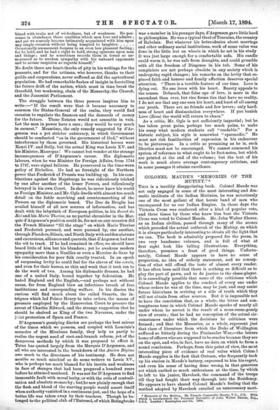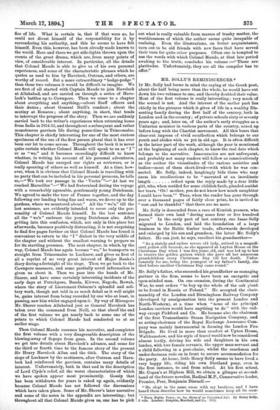COLONEL MAUDE'S "MEMORIES OF THE MUTINY." *
THIS is a terribly disappointing book. Colonel Mande was not only engaged in some of the moat interesting and dra- matic incidents of the Indian Mutinies, he was notoriously one of the most gallant of that heroic band of men who reconquered for us our Indian Empire. In those days the Victoria Cross was conferred after a kind of popular vote, and three times by those who knew him best the Victoria Cross was voted to Colonel Mande. Mr. John Walter Sherer, as an Indian civilian, passed through many of the scenes which preceded the actual outbreak of the Mutiny, on which it is always particularly interesting to obtain all the light that we can. The book is admirably prepared for the press, in two very handsome volumes, and is full of what at first sight look like telling illustrations. Everything, therefore, promises a feast of good things. Unfortu- nately, Colonel Maude appears to have no sense of proportion, no idea of orderly statement, and no concep- tion of what will offend the taste of almost every reader. It has often been said that there is nothing so difficult as to play the part of pawn, and to do justice to the chess-player. It is exceedingly possible that some of the criticisms which Colonel Mande applies to the conduct of every one Tinder whose orders he was at the time, may be just, and may assist future historians in arriving at a side of truth which they will not obtain from other sources. But it is impossible not to have the conviction that, as a whole, the bitter and con- temptuous tone in which Colonel Maude speaks of nearly all under whom he served is the result of a mess-room-gossip view of events ; that he had no conception of the actual cir- cumstances under which the decisions he criticises were formed ; and that the Memories, as a whole, represent just that class of literature from which the Duke of Wellington suffered so bitterly during the Peninsular War,—the letters home of officers who are supposed to be oracles because they are on the spot, and who, in fact, have no data on which to form a sound conclusion. Perhaps, from this point of view, the most interesting piece of evidence of real value which Colons 1 Mande supplies is the fact that Outram, who frequently took up his station in Maude's battery, expressed to him his regret, and even his sense of having done wrong, in that generous act which excited so much enthusiasm at the time, by which he left to his junior, Havelock, the command of the troops till they had fought their way through into the Residency. He appears to have shared Colonel Maude's feeling that the method adopted by Havelock entailed an unnecessary sacri-
Memories of the Mutiny. By Francis Cornwallis Mande, 4.0., C.B. With which is incorporated the Personal Narrative of John Walter Sharer, Esq.. 0.8.I. London : Remington and Co. 1894.
floe of life. What is certain is, that if that were so, he could not divest himself of the responsibility for it by surrendering his authority, and this he seems to have felt himself. Even this, however, has been already made known to the world. Here and there we get side-lights thrown upon the events of the great drama, which are, from many points of view, of considerable interest. In particular, all the details that Colonel Maude is able to give us of his own personal experiences, and some of the characteristic phrases which he quotes as used to him by Havelock, Outram, and others, are worthy of record. But a more extraordinary " hodge-podge " than these two volumes it would be difficult to imagine. We are first of all started with Captain Maude to join Havelock at Allahabad, and are carried on through a series of Have- lock's battles np to Cawnpore. Then we come to a chapter about everything and anything,--about Staff officers and their duties ; about General Neill's conduct ; about the mutiny at Benares ; about anything, in short, that tends to interrupt the progress of the story. Then we are suddenly carried back to the writer's experiences when returning home from India in 1854-55, and throughout a subsequent and rather monotonous garrison life during peace-time in Trincomalee. This chapter is chiefly interesting for one of the most curious specimens of the use of the first person plural that it has ever been our lot to come across. Throughout the book it is never quite certain whether Colonel Maude will speak to us as " I " or as "we," and it becomes exceedingly difficult to know whether, in writing his account of his personal adventures, Colonel Maude has usurped our rights as reviewers, or is really speaking of others as well as himself. At a time, how- ever, when it is obvious that Colonel Maude is travelling with no party that can be included in his personal pronoun, he tells us,—" We took our passage in the Vectis"—" At last we reached Marseilles "—" We had fraternised during the voyage with a remarkably agreeable, gentlemanly young Dutchman. We agreed to make the tour of France together, and the day following our landing being fine and warm, we drove up to the gardens, where we sauntered about." All the " we's," till the last sentence, are evidently intended to cover only the per- sonality of Colonel Maude himself. In the last sentence all the " we's " embrace the young Dutchman also. After getting into this confusion, which, not only in this place but afterwards, becomes positively distracting, it is not surprising to find five pages further on that Colonel Maude has found it convenient to return to the "I" dialect in the very middle of the chapter and without the smallest warning to prepare us for its startling presence. The next chapter, in which, by the way, Colonel Mande has again become "we," he transports us straight from Trincomalee to Lucknow, and gives us first of all a reprint of no very great interest of Major Banks's diary during a fortnight of the siege. Then we go back to the Cawnpore massacre, and some partially novel information is given us about it. Then we pass into the hands of Mr. Sherer, and have some certainly interesting incidents of the early days at Futtehpore, Banda, Kirwee, Nagode, Rewah, where the story of Lieutenant Osborne's splendid and soli- tary work, though not told in as mach detail as it well might be, gains interest from being recorded by one who at least, in passing, saw him whilst engaged upon it. By way of Mirzapore Mr. Sherer reaches Allahabad just as General Havelock has taken over the command from Neill, so that abouthe end of the first volume we get nearly back to some one of the points to which Colonel Maude had conducted us at an earlier stage.
Then Colonel Maude resumes his narrative, and completes the first volume with a very disagreeable description of the blowing-away of Sepoys from guns. In the second volume we get into details about Havelock's advance, and come for the third or fourth time to the famous story of the present Sir Henry Havelock Allan and the 64th. The story of the siege of Lucknow by the mutineers, after Oatram and Have- lock had reinforced the garrison, contains many details of interest. Unfortunately, both in that and in the description of Lord Clyde's relief, all the worst characteristics of which we have spoken appear most prominently. Gossip that has been withdrawn for years is raked up again, evidently because Colonel Maude has not followed the discussions which have taken place. Some of Mr. Sherer's later narrative and some of the notes in the appendix are interesting ; but throughout all that Colonel Maude gives us, one has to pick out what is really valuable from masses of trashy matter, the worthlessness of which the author seems quite incapable of realising. Even the illustrations, on better acquaintance, turn out to be old friends with new faces that have served their turn for quite other purposes. Often one is tempted to use the words with which Colonel Maude, at that late period awaking to the truth, concludes his volume :—" These are platitudes. Unfortunately, they are all the compiler has to offer."



































 Previous page
Previous page